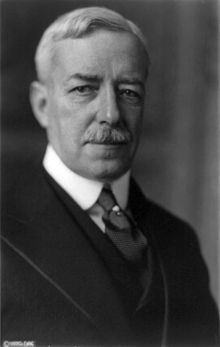Robert Lansing
| Robert Lansing | |
|---|---|
 |
|
| 42nd United States Secretary of State | |
|
In office June 24, 1915 – February 13, 1920 |
|
| President | Woodrow Wilson |
| Preceded by | William Jennings Bryan |
| Succeeded by | Bainbridge Colby |
| Personal details | |
| Born |
October 17, 1864 Watertown, New York, U.S. |
| Died | October 30, 1928 (aged 64) New York City, U.S. |
| Political party | Democratic |
| Spouse(s) | Eleanor Foster Lansing (1890 - 1928, his death) |
| Alma mater | Amherst College |
| Profession | Lawyer, politician |
Robert Lansing (/ˈlænsɪŋ/; October 17, 1864 – October 30, 1928) was an American lawyer and Conservative Democratic politician who served as Legal Advisor to the State Department at the outbreak of World War I, and then as United States Secretary of State under President Woodrow Wilson from 1915 to 1920. Before U.S. involvement in the war, Lansing vigorously advocated in favor of the principles of freedom of the seas and the rights of neutral nations. He later advocated U.S. participation in World War I, negotiated the Lansing–Ishii Agreement with Japan in 1917 and was a member of the American Commission to Negotiate Peace at Paris in 1919.
Robert Lansing was born in Watertown, New York in October 1864, the son of John Lansing (1832–1907) and Maria Lay (Dodge) Lansing. He graduated from Amherst College in 1886, studied law, and was admitted to the bar in 1889.
From then until 1907 he was a member of the law firm of Lansing & Lansing at Watertown. An authority on international law, he served as associate counsel for the United States, in the Bering Sea Arbitration in 1892-1893, as counsel for the United States Bering Sea Claims Commission in 1896-1897, as the government's lawyer before the Alaskan Boundary Tribunal in 1903, as counsel for the North Atlantic Fisheries in the Arbitration at The Hague in 1909-1910, and as agent of the United States in the American and British Arbitration in 1912-1914. In 1914 Lansing was appointed counselor to the State Department by President Woodrow Wilson.
...
Wikipedia
